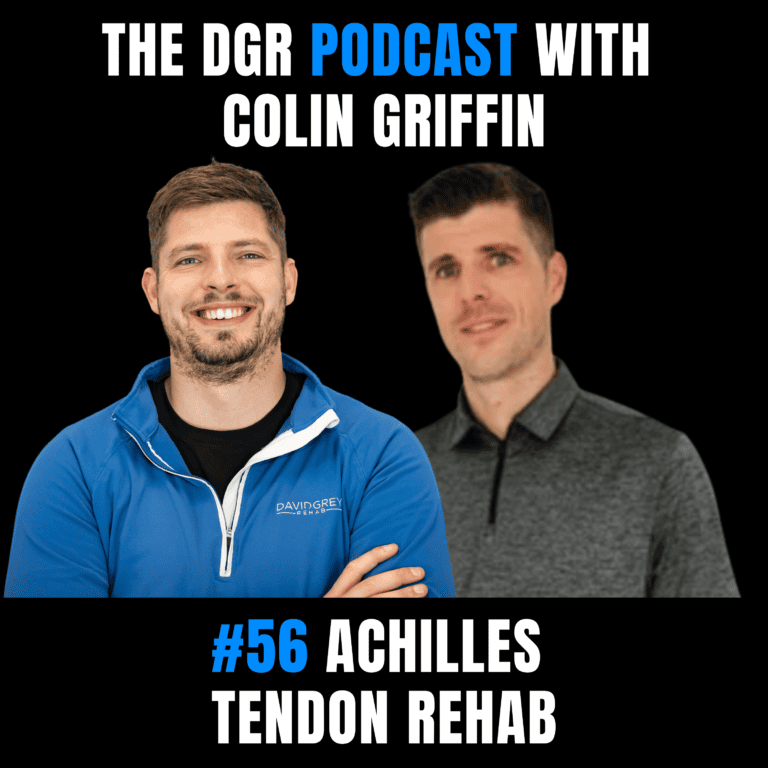
Podcast: Play in new window | Download
In this episode of the David Grey Rehab Podcast, I sit down with Colin Griffin, strength and conditioning coach at the Sports Surgery Clinic (SSC) in Dublin, where he is Clinic Lead for Foot and Ankle Rehabilitation.
Along side managing a clinical team and treating complex lower limb injuries, he is currently approaching the completion of a PhD at the University of Côte d’Azur in France, investigating Achilles Tendinopathy Rehabilitation and Lower Limb Biomechanics.
Colin has a wealth of knowledge in the field, and David wastes no time in making the most of this and picking his brain. Colin drops some real pearls of wisdom, and shares some very valuable lessons he’s learned as a clinician.
“With tendinopathies it’s very much individual basis, the biological and even psychological factors that drive Achilles tendinopathy and Achilles pain, and having to take things on a case by case basis and knowing how to assess and rule out, and knowing how to narrow down your focus. A one size fits all doesn’t really work for everyone.” Colin Griffin
If you enjoyed this podcast, SHARE it with a loved one and RATE/REVIEW it on Spotify or Apple Podcasts!
Episode Timeline | What You’ll Learn:
(00:14) – Introducing the episode.
(02:45) – Colin joins the episode.
(03:12) – Colin’s PHD – What it’s on and where it’s up to.
(06:33) – Main lessons learnt from doing the study.
(08:17) – The soleus muscle’s relationship with bodyweight.
(09:46) – The difference between rehabbing a ham string and a calf injury.
(14:06) – How Colin asses lower leg injury and movement
(20:48) – How Colin feels about seated calf raises.
(30:52) – How Colin uses standing calf raises.
(40:03) – Colin’s approach to building foot strength.
(43:22) – The use of plyometrics in the rehabbing process, and Colin’s usual plyometric sequence.
(45:11) – Indicators that a patient’s gait needs looked at.
(47:26) – Treating an Achilles tendinopathy during the season.
(52:44) – Why did Colin become so interested in the Achilles and the Calf.
(54:37) – Colin’s transition from walking to running.
(56:17) – Potential Achilles and calf issues arising from gym based muscle and weight gain.
(01:00:33) – How to connect with Colin.
(01:01:06) – Episode round up and outro.
“When somebody comes in and has a sore Achilles for example, even if its an insertional tendinopathy where you know the dorsiflexion’s gonna be at a bit more compressive loads, they can still do a seated calf raise going into dorsiflexion when they can’t do it standing. So it’s just a nice way to work around it aswell, if there’s a limiting factor, because you’ve only got one muscle that’s doing most of the work in that seated position as opposed to all three muscles.” Colin Griffin
Connect with Colin Griffin:
Connect with David Grey Rehab:
Follow David Grey Rehab on Instagram
Listen to more podcast episodes
Subscribe to our YouTube channel
Visit the DGR Interactive platform!
About The Guest:
Colin Griffin works as a strength and conditioning coach at the Sports Surgery Clinic (SSC) in Dublin, where he is Clinic Lead for Foot and Ankle Rehabilitation. His role involves managing a clinical team and treating complex lower limb injuries. Combined with his clinical role, he is currently undertaking a PhD at the University of Côte d’Azur in France, investigating Achilles tendinopathy rehabilitation and lower limb biomechanics.
Colin has been working at the SSC since 2014. He is a former Irish international athlete who competed at the 2008 and 2012 Olympic Games in the 50km Walk. His career highlights included finishing 10th at the 2010 European Championships and 12th at the 2012 World Cup, as well as previously holding the Irish record for the 50km walk. Since retiring from his race walking career in 2013, Colin has been a regular participant in domestic road races with a marathon PB of 2.23.00 and half marathon 68.51. He also provides strength and conditioning support to some leading Irish athletes and coaches a number of distance runners.


